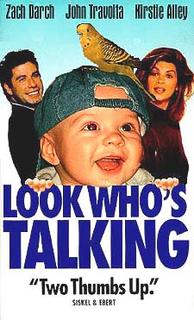This post is a result of some enthusiasm I received from the readers of my last post in the form of a few questions. I'll tackle the first question now: how does a child really start its acquisition process? I don't think I can do enough justice though, partially because of my limitations and partially because there is too much information to condense into a small article. An idea of theoretical computer science may be helpful. However, links are provided when required for comprehension. I'll try and answer the other questions in coming posts. The acquisition of language in a child has got to be one of the most fascinating processes to witness for any parent. Most parents are awed by the sudden burst in the proficiency of their child's language. Going from barely acknowledging the understanding of a simple word, the child learns to converse fluently within a span of just a few years - a feat even a supercomputer cannot achieve at the time of the writing of this post. The most fascinating parts are the early stages of this process where the child just begins to posit a structure to the environment around it. The process of generalization can only become easier during the later phases, because the child can always bootstrap.
The acquisition of language in a child has got to be one of the most fascinating processes to witness for any parent. Most parents are awed by the sudden burst in the proficiency of their child's language. Going from barely acknowledging the understanding of a simple word, the child learns to converse fluently within a span of just a few years - a feat even a supercomputer cannot achieve at the time of the writing of this post. The most fascinating parts are the early stages of this process where the child just begins to posit a structure to the environment around it. The process of generalization can only become easier during the later phases, because the child can always bootstrap.Debates on the process of acquisition start from the very birth of the child. The most fundamental debate is on whether there exists a special faculty or conceptual organ developed for language. The school of thought lead by Noam Chomsky believes in such a dedicated faculty, leading to the concept of a Universal Grammar. The argument supporting this idea is that children manage to restrict their grammar in the absence of negative examples and explicit correction. It has been proved that even regular languages are unlearnable under such conditions, and natural languages are known to be atleast context-free. The opposition, most strongly voiced by Michael Tomasello, considers language to be a complex system that is handed down from generation to generation, with absolutely no genetic adaptation. They of course have their own arguments, and computational linguists like Simon Kirby have designed very interesting simulations to support it.
Let's get back to our protagonist of this article, shall we? - the child , still a baby as of now.
The first thing that every parent waits for is for the baby's first word. The process of acquisition obviously starts with single words. How does a child learn its first words? You must realize that determining this is not as simple as it seems. Associating a word with a concept requires many sensory and cognitive processes. Firstly, the child must be able to segment the verbal input phonologically in order to distinguish a word. The child is also just then forming the conceptual map in his head, and must successfully associate these recognizable sounds with the concepts in its head.
Rather cute (and cute-sounding) experiments like High-Amplitude Sucking have shown that babies can hear the full range of sounds as adults and can distinguish between sounds just as finely. All the baby now needs to do is recognize patterns in the sounds and realize that they are to be mapped to certain concepts. Studies show that infants like humans in general have the inborn ability to recognize repeated patterns. It has been suggested that motherese, the way adults speak to babies with a lot of melody and intonation, helps the baby pick up patterns better. Given this toolset, the infant starts mapping these patterns to concepts. It is obvious that it first learns words that have meanings that it can easily map - physical objects around him (duckie, table), people around him (mom, dad), events (drink, eat) etc. It is also known that a baby understands many words even before it starts producing them.
The child eventually begins to use these single words to express more complex concepts. For e.g. it might say 'cup' to express 'I want the cup' as well as 'I can see the cup'. This expression of more complex thoughts also implies that the baby is positing a structure to the world around it. The single-word phase then matures into a two-word and then a multiword phase. Utterances like 'daddy good' and 'water no' mature to 'where wrench go? '.
Steven Pinker suggests that infants generalize utterances into an early grammar using verb meanings. These verb meanings are learnt from observation. Lila and Henry Gleitman think that the exact opposite is at play - the child learns the meanings of verbs using the early syntax that it learns from pure pattern recognition. Perhaps both processes go on - both Pinker and the Gleitmans have later acknowledged that this is indeed possible. One interesting fact is that although children make mistakes in morphology (e.g. 'can i keep the screwdriver like the mechanic keep the screwdriver?'), they almost never make mistakes in word order.
Once a basic grammar is formed in the child's head, it can move on to conquer exceptions like irregular verbs, idioms and the sort. Utterances like 'I goed to the market' are heard often enough from children. However, all becomes fine and dandy soon, and the child starts speaking just like an adult. The only process of acquisition that goes on beyond the critical period (ending at puberty) is that of lexical acquisition, which goes on as long as the individual is interested!
 'Brfxxccxxmnpcccclllmmnprxvclmnckssqlbb11116'. In 1991, a Swedish couple registered this atrocity as their son's name when they were fined by a district court for not naming their son for 5 years. They claimed it to be "a pregnant, expressionistic development that we see as an artistic creation", and was to be pronounced 'Albin'. The court rejected the registeration, after which the couple tried to name their child 'A' (hmm... a preincarnation of Upendra?). The court didn't accept that either - but only because it was illegal in Sweden to have names that short!
'Brfxxccxxmnpcccclllmmnprxvclmnckssqlbb11116'. In 1991, a Swedish couple registered this atrocity as their son's name when they were fined by a district court for not naming their son for 5 years. They claimed it to be "a pregnant, expressionistic development that we see as an artistic creation", and was to be pronounced 'Albin'. The court rejected the registeration, after which the couple tried to name their child 'A' (hmm... a preincarnation of Upendra?). The court didn't accept that either - but only because it was illegal in Sweden to have names that short!













